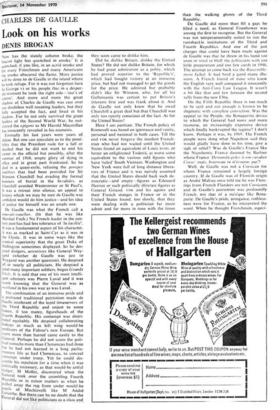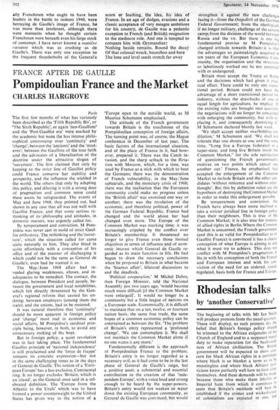CHARLES DE GAULLE
Look on his works
PENIS BROGAN .Now has the stately column broke, the beacon light has quenched in smoke.' It is quenched, if you like, in an acrid smoke and for many Frenchmen and many Americans the smoke obscured the flame. More justice will be done to de Gaulle in the island where he took refuge. For it was not forgotten here by George vi or his people that in a desper- ate moment he took the right side—'our's of course'. And more and more the great shadow of Charles de Gaulle was cast over our doubtless well meaning leaders, but they fully accepted the fact, and lived in his shadow. For he not only survived the great leaders of the Second World War, he out- classed the epigoni as Mr Harold Macmillan has innocently revealed in his memoirs.
Formally his last years were years of. defeat. But one can speculate as to the possi- bility that the President rode for a fall or decided that he did not want to end his career in the official but possibly, after the summer of 1968, empty glory of dying in office and in great part frustrated. So he died in a quasi-exile, refusing the pompes funebres that had been provided for Sir Winston Churchill but evading the formal honours of burial in the Invalides, as Churchill avoided Westminster or St Paul's. It was a retreat into silence, an appeal to history which we may be sure de Gaulle was confident would do him justice—and his idea of justice for himself was an ample one.
De Gaulle was what the French call a mauvais-coucher. (In that he was like Marshal Foch.) No French leader in the cen- tury past has had less tolerance of la facilite. It was a fundamental aspect of his character. It was as marked at Saint-Cyr as it was in the Elyse. It was in some ways like the ironical superiority that the great Duke of Wellington sometimes displayed. So he des- pised dodgers, attentistes like General Wey- gand (whether de Gaulle was just to Weygand was another question). He despised all or nearly all politicians. He despised a great many important soldiers, bogus Grands Chefs. It is odd that one of his most intelli- gent admirers was Pierre Laval and it was worth knowing that the General was as roubland in his own way as was Laval.
The combination of an immense pride and a profound traditional patriotism made de Gaulle intolerant of the tepid timeservers of the Third Republic and unjust to some honest, if too matey, figureheads of the Fourth Republic. His contempt was distri- buted equitably. He despised collaborating bishops as much as left wing would-be Profiteers of the Fiihrer's new Europe. But scorn more than hatred came easily to the General. Perhaps he did not scorn the poli- tical eunuchs more than Clemencau had done but he had not learned in a long parlia- mentary life as had Clemencau, to conceal contempt under irony. Yet he could dis- semble his repulsion for a time when it was Politically necessary, as that would-be artful dodger, M Mollet, discovered when the General took over the crumbling Fourth Republic or in minor matters as when he Pulled away the rug from under would-be pupils of Machiavelli like M Andre Labarthe. But there can be no doubt that the
eneral did not like politicians as a class and they soon came to dislike him.
Did he dislike Britain, dislike the United States? He did not dislike Britain, for which he had great admiration as a polity, which had proved superior to the 'Republic's', which had bought victory at an immense price, but had not managed to get the goods for the price. He admired but probably didn't like Sir Winston, who, for all his Gallomania was certain to put Britain's interests first and was frank about it. And de Gaulle not only knew that he owed Churchill a great deal but that Churchill was only too openly conscious of the fact. As for the United States!
Here I am partisan. The French policy of Roosevelt was based on ignorance and vanity, personal and national in both cases. Till the end FOR never forgave the insolent French- man who had not waited until the United States found an equivalent of Louis xvitt, or better an enlightened Todesta, at worst some equivalent to the various odd figures who have 'ruled' South Vietnam. Washington and New York were full of long distance libera- tors of France and it was naively assumed that the United States should back such de- mocratic—and empty—figures as Edouard Herriot or such politically illiterate figures as General Giraud. FOR and his agents and their French stooges in France or in the United States found, too slowly, that they were dealing with a politician far more adroit and far more in tune with the times
than the walking ghosts of the Third Republic.
De Gaulle did more than fill a gap; he filled a need, as General Eisenhower was among the first to recognise. But the General was not temperamentally suited to run the ramshackle institutions of the Third and Fourth Republics. And one of the just charges that could have been made against de Gaulle was that he threw in his hand too soon or tried to bluff the politicians with too little preparation and too few cards in 1946. The attempt to come back via the Rassemble- mem failed. It had bred a good many illu- sions. A French friend of mine who knew the English very well compared it innocently with the Anti-Corn Law League. It wasn't a bit like that and few foresaw the second sally from the new Elba.
On the Fifth Republic there is too much to be said and not enough is known to be dogmatic with complete conviction. Was the appeal to the People. the Bonapartist device to which the General had more and more recourse, an increasingly expensive device which finally bankrupted the regime? I don't know. Perhaps it was, by 1969. The French people were dong what Napoleon said they would gladly have done in his time, give a sigh of relief? Was de Gaulle's France like the Napoleonic France damned by Barbier whose France Dentanda grace a son cavalier Corse: mais, bourreau tu n'ecoutas pas'?
Well, de Gaulle was not a Corsican for whom France remained a largely foreign country. If de Gaulle was of Flemish origin as Andre Malrau once told me he was Flem- ings from French Flanders are not Corsicans and de Gaulle's patriotism was profoundly French. not that of a miteque like Bona- parte. De Gaulle's pride, arrogance, ruthless- ness were for France, as he interpreted the word. When he thought Frenchmen, especi ally Frenchmen who ought to have been leaders in the battle to redeem 1940, were betraying de Gaulle's image of France, he was more than intolerant, although there " were moments when he thought certain Frenchmen were beneath even his large stock of contempt. I have never known a maniere cassante which was as crushing as de Gaulle's. There was only one exception to the frequent thunderbolts of the General's scorn or loathing, the Idea, his idea of France. In an age of dodges, evasions and a classic acceptance of very meagre ambitions for his country, de Gaulle was a pedantic exception to French (and British) resignation to the mediocre role. And one is tempted to compare him with Ozymandias:
Nothing beside remains. Round the decay Of that colossal wreck, boundless and bare The lone and level sands stretch far away









































 Previous page
Previous page